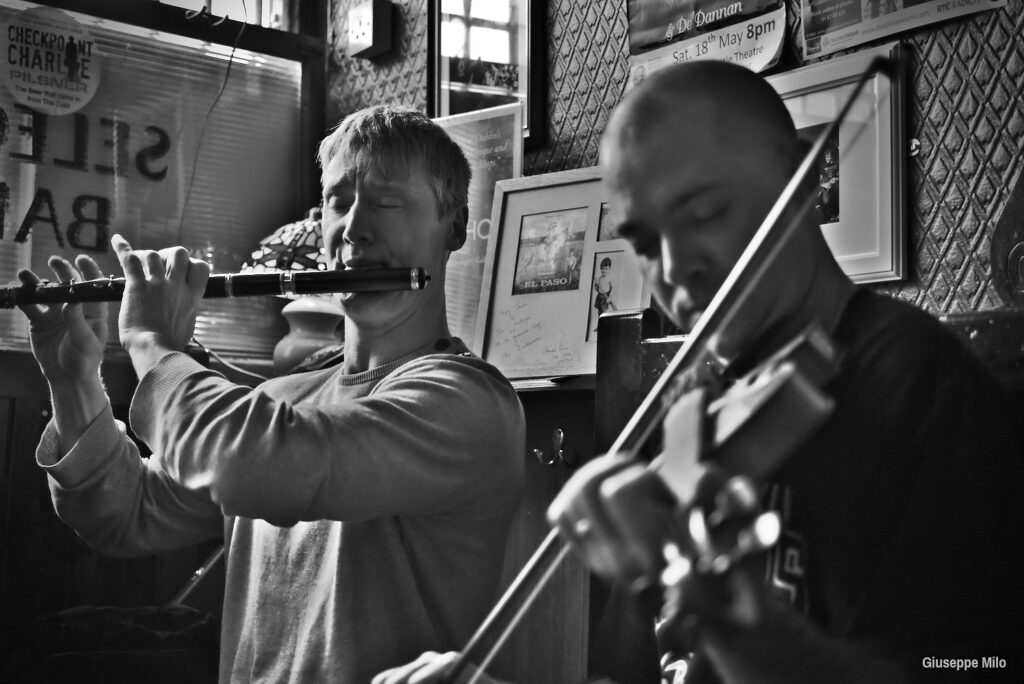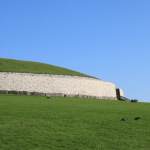You don’t have to learn all about Ireland before you visit; you can just jump on a plane and discover everything as you travel around our incredible island. However, learning about our traditions before you visit will help you discover which parts of Irish culture, heritage, and history interest you most, giving your trip more direction and purpose. It will also enrich your time here as you will understand more of the context and significance of the places you visit and the people you meet along the way. Ireland is a country steeped in tradition, and there is a lot of fun and fascination to be had here. If anything in this guide inspires you to visit the Emerald Isle, check out our small group tours of Ireland to find the perfect trip for you.
Reek Sunday — A Religious Pilgrimage
It’s an annual tradition in Ireland to take a pilgrimage up Croagh Patrick, the 764 m mountain in County Mayo on Reek Sunday — the last Sunday in July. Some of the die-hard locals may even walk up the mountain in their bare feet, but this definitely isn’t essential. The pilgrimage is taken in honor of Saint Patrick, Ireland’s patron saint, who was said to have fasted for 40 days on the mountain. ‘Croagh’ simply means hill or mountain, so Croagh Patrick literally translates to Patrick’s Mountain or Mount Patrick, depending on what you think sounds better in English. Taking part in Reek Sunday is obviously great for visitors who are members of the Catholic faith, but everyone is welcome, really. There’s a great atmosphere as you climb the mountain with hundreds of other people. It is tradition to hike up the mountain on Reek Sunday, but it’s a beautiful climb at any time of year. If this sounds like your kind of adventure and you’re looking for a longer guided experience, check out our Great Atlantic Adventure 7-Day Tour of Ireland.

Sports the Irish Love
The only thing better than gathering together in the pub with family and friends is gathering together in the pub with family and friends as you watch sport! So many of our traditions revolve around sports; we’re obsessed with sports, and we have an affinity with anyone else who loves it as much as we do.
The Irish love football as much as most other countries — even if we don’t always make the best account of ourselves during the World Cups… We love rugby more than most countries do, and if you want to hear the smartest rugby commentary you’ve ever heard then you just have to strike up a conversation with any random old man called Keith in the pub when a rugby match is on.
But rugby and football are easy for guests to understand, it’s the weird and wonderful world of the Gaelic Athletic Association (GAA) that confuses tourists. The most popular Gaelic games include Gaelic football (a lot like Aussie rules), hurling (like Gaelic football crossed with hockey and lacrosse), Gaelic handball (very similar to American handball), and rounders (a lot like baseball). GAA sports are played at an extremely high level, but they are still just amateur, without a lot of the money associated with rugby and football. If you have the time, try to watch a game of hurling or Gaelic football in an Irish pub; it’s perhaps the most traditionally Irish thing you can do!

Traditional Irish Music
We could write ten blogs all about Irish music and we would still have only scratched the surface. But talking or writing about music usually misses the point. Music is there to be listened to. That said, we’ll try to talk about music here, but we also recommend that you type ‘Irish music’ into Spotify and see where it takes you…
For a relatively small country, we have produced more than our fair share of famous bands and solo acts — from U2, Thin Lizzy, and The Cranberries in the south to The Undertones, Two Door Cinema Club, and Van Morison in the north. Music is one of Ireland’s great exports to the rest of the world and it starts at home, with traditional Irish music.
Traditional Irish music is one of the most recognizable styles of music in the world, and it seems to have survived and flourished more than most other European countries. In fact, the only obvious competitor, in terms of folk music, is Spain. One reason Irish music has survived so long is partly due to the fact that the Irish economy has been mostly based around agriculture for centuries, and farming communities tend to have a stronger sense of oral tradition. Another theory posits that Irish music has endured where others have not because Ireland wasn’t a battleground during WW1 or WW2.
It can be understood a little more simply, however: our music stirs emotions in listeners. Whether it’s a jaunty jig or a heart-wrenching ballad, traditional Irish music makes you feel something. That’s why it has stood the test of time, and that’s why Irish music is recognizable all around the world. That said, there’s nothing like hearing traditional Irish folk music in a busy pub. Everyone is singing along, a few folks are dancing, and the atmosphere is incredible.
There are no hard-and-fast rules for what constitutes traditional Irish music. There are a few recognizable features, however, such as common time signatures like 3/4 (waltz), 6/8 (called a double jig), and 9/8 (called a slip jig). You’ll often get a fiddle in the mix, but not always, and there are usually a few guitars, a mandolin or two, and at least a couple of tin whistles or flutes. And that’s not even going into detail about bodhrán and other drums and percussion instruments!

Celebrating Saint Patrick’s Day in Ireland
Anyone who lives in New York has experienced a bigger Saint Patrick’s Day parade than anything we have in Ireland. In fact, there are Saint Patrick’s Day parades in New Zealand, Australia, Germany, Argentina, and a bunch of other countries around the world. The Irish diaspora is wide-reaching, with descendants of Irish immigrants all around the world. People with Irish heritage in the US, Canada, Australia, and beyond all like to celebrate their Irish origins. So, celebrating Saint Patrick’s Day is an Irish tradition that absolutely doesn’t have to occur in Ireland, but it is guaranteed to hold a different significance here. While you shouldn’t expect green Guinness, we do lean into some of our own stereotypes; if there’s one thing the Irish are known for, it’s not taking ourselves too seriously! St Patrick’s Day in Ireland is a blast, but we hope you’ll join in on the celebrations wherever you are in the world.
Of course, there are many other Irish traditions we haven’t discussed here. Ireland is, after all, a country and a culture built on tradition. But we hope we’ve whetted your appetite just a little for the hijinks and shenanigans you can look forward to when you visit the Emerald Isle. If you have any questions about the tours we’ve mentioned in this guide, or if you want to know a little more about our self-drive tours of Ireland, please feel free to get in touch. Whether you’re looking for a dose of Irish tradition and culture or an adventure in the wilder parts of the countryside, we can’t wait to welcome you to Ireland soon!







